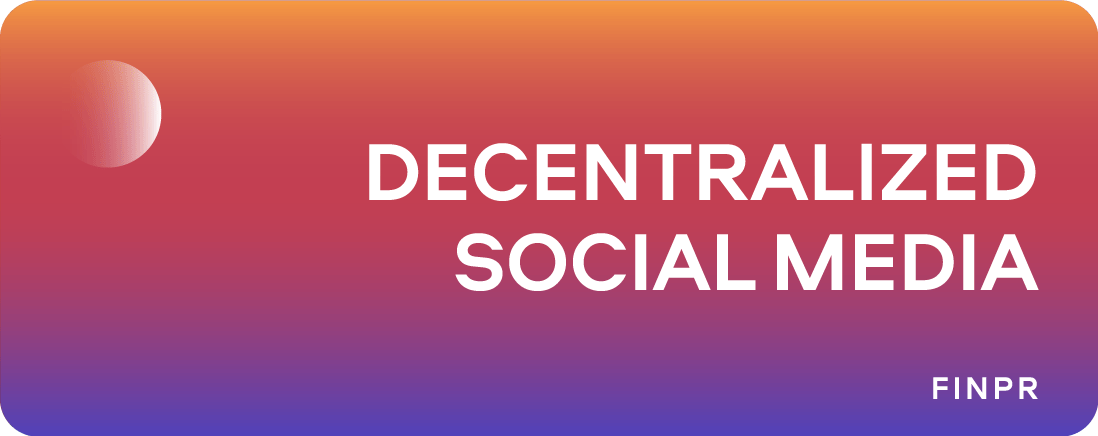
Decentralized social media refers to online platforms that operate on a decentralized network, typically leveraging blockchain technology or other peer-to-peer protocols. Unlike traditional social media platforms, which are controlled by centralized entities that manage data and user interactions, decentralized social media disperses control across a network of independent nodes. This structure allows for greater transparency, user control, and resistance to censorship.
The importance of decentralization in social media is growing as concerns about privacy, data security, and censorship continue to rise. Users are increasingly seeking alternatives that offer more control over their online presence and the content they share.
These 6 decentralized social media addresses these concerns by providing a more democratic and secure environment for digital interactions.
6 Decentralized Social Media: An In-Depth Exploration
1. Mastodon
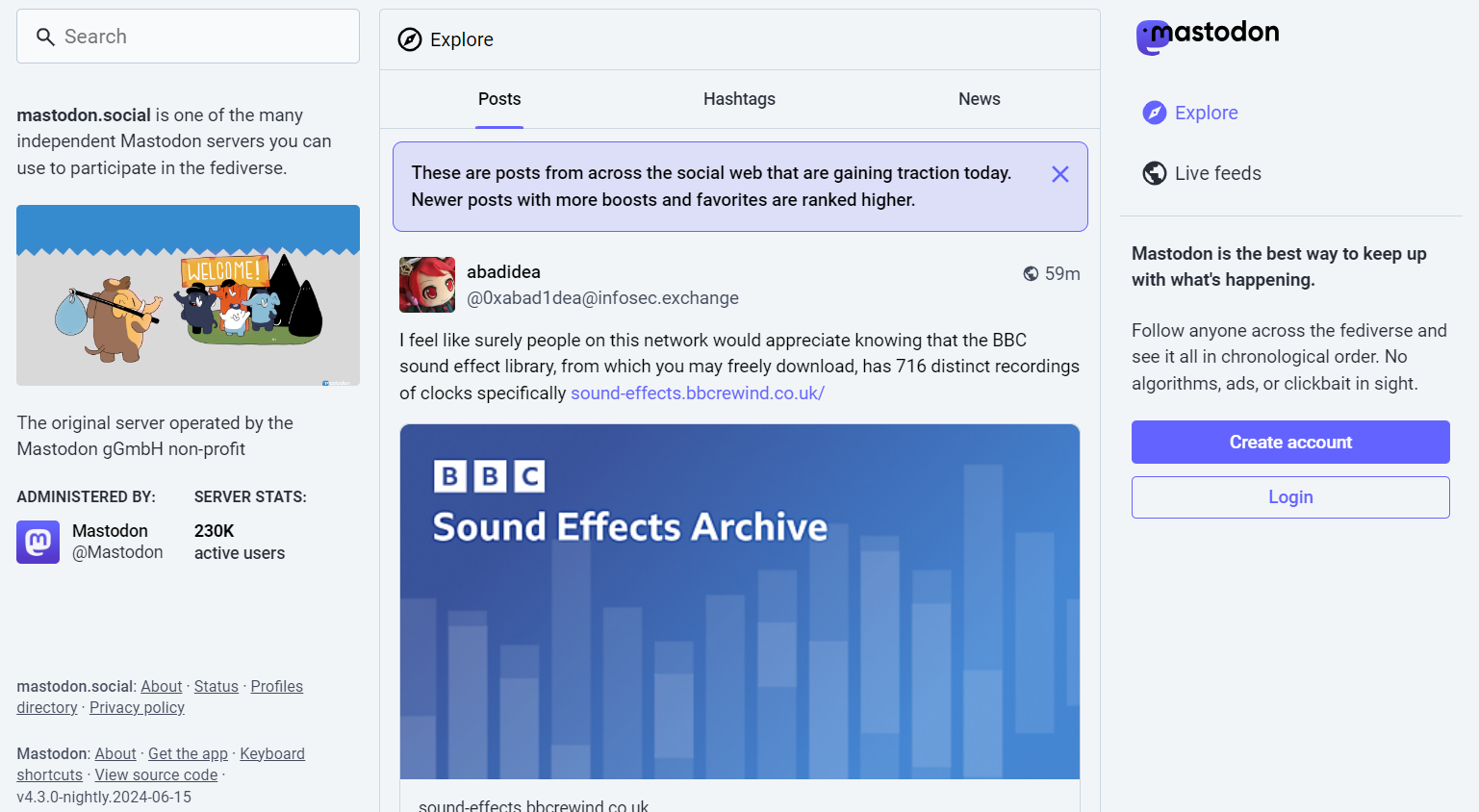
Mastodon is a prominent decentralized social media platform that functions similarly to Twitter but with a key difference: it is entirely open-source and community-driven. With over three million users, Mastodon allows individuals to set up their own servers, or "instances," giving them full control over content moderation and privacy. This federated model ensures that no central authority dictates the platform’s policies, fostering a diverse and inclusive environment where users can interact without algorithmic interference.
Mastodon’s chronological feed and robust support for various media types - text, images, videos, and GIFs - make it a versatile alternative to traditional social networks. Users appreciate its commitment to privacy and control, allowing them to curate their own online experience.
What the platform has to offer:
- Open-source and community-driven
- Federated model for individual server control
- Chronological feed without algorithmic bias
- Strong emphasis on user privacy and control
2. Minds

Minds is a Web3 social platform designed to provide users with greater control over their data and content. It operates on the Ethereum blockchain and uses a native utility token, Minds Tokens, which users can earn through their engagement on the platform. These tokens can be used to boost content, upgrade channels, and support other creators, creating a self-sustaining ecosystem that rewards active participation.
The platform is not limited to cryptocurrency enthusiasts. It encompasses a broad range of topics, making it accessible to a general audience. Minds stands out for its dedication to free expression and user privacy, with a decentralized model that prevents censorship and protects user data.
What the platform has to offer:
- Blockchain-based platform with a native token system
- Rewards for user engagement
- Emphasis on free expression and privacy
- Broad topic range beyond just cryptocurrency
- Decentralized to prevent censorship
3. Peepeth
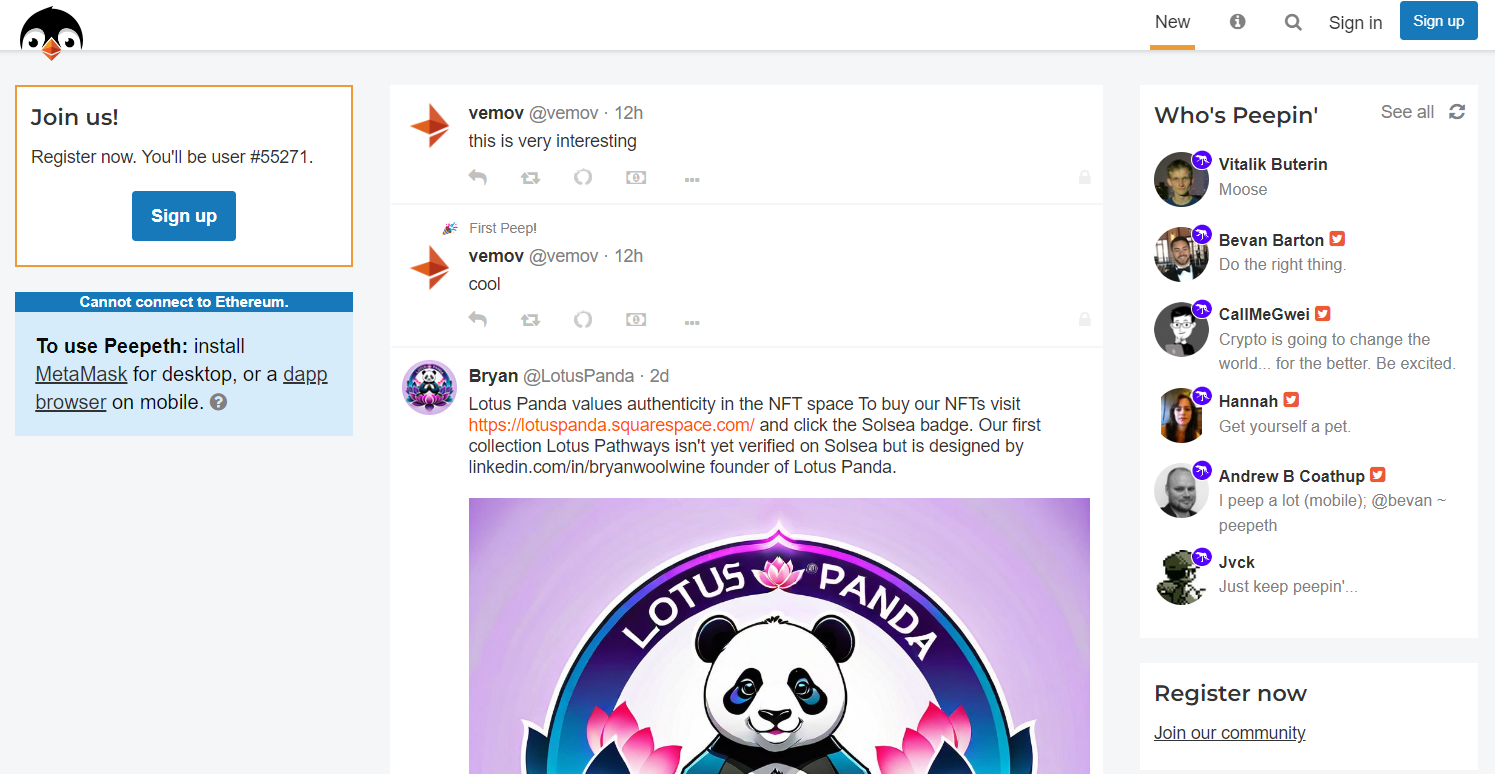
Peepeth is a decentralized social network built on the Ethereum blockchain, emphasizing positive and constructive communication. The platform records all user activity on the blockchain, ensuring data transparency and immutability. Users can create profiles, post messages, for example, about new meme coins, and interact with others in a censorship-resistant environment. Peepeth's design encourages ethical behavior and thoughtful contributions, aiming to foster a more constructive online community.
Peepeth supports hashtags, mentions, reactions, and private messaging, providing a comprehensive social networking experience. Its unique approach to content management and user interaction sets it apart from more traditional social networks.
What the platform has to offer:
- Ethereum-based for data transparency and immutability
- Encourages positive and ethical communication
- Comprehensive features like hashtags, mentions, and reactions
- Focus on thoughtful contributions
4. Lens Protocol
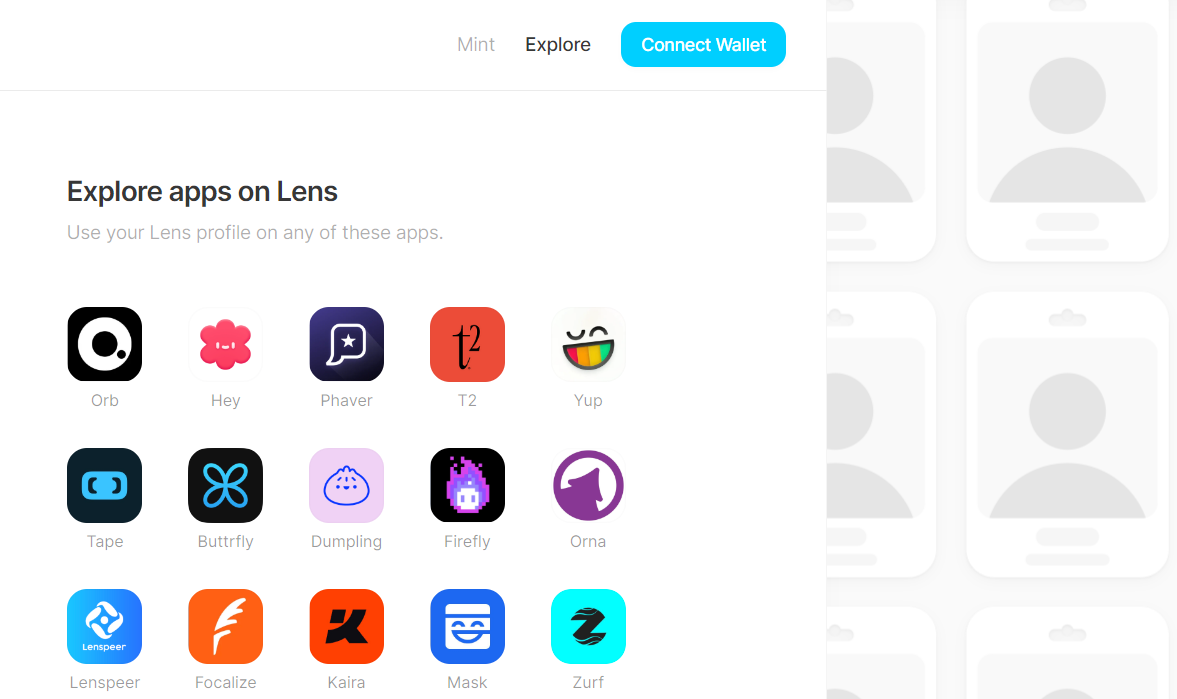
Lens Protocol is a decentralized social media platform launched by Aave, a leading DeFi project. It leverages the Polygon network to provide a user-centric experience that prioritizes data ownership and privacy. Users can mint Lens handles as NFTs, allowing for interoperability with other dApps and smart contracts within the LensVerse ecosystem.
Lens Protocol offers various features, including profiles, messaging, and groups, and uses a decentralized moderation system to prevent censorship. The platform incentivizes user activity with cryptocurrency rewards, fostering a transparent and user-controlled social network.
What the platform has to offer:
- Built on the Polygon network for low gas fees and fast transactions
- NFT-based user handles for interoperability
- Decentralized moderation system
- Incentives for user activity through cryptocurrency rewards
- Focus on data ownership and privacy
5. LBRY
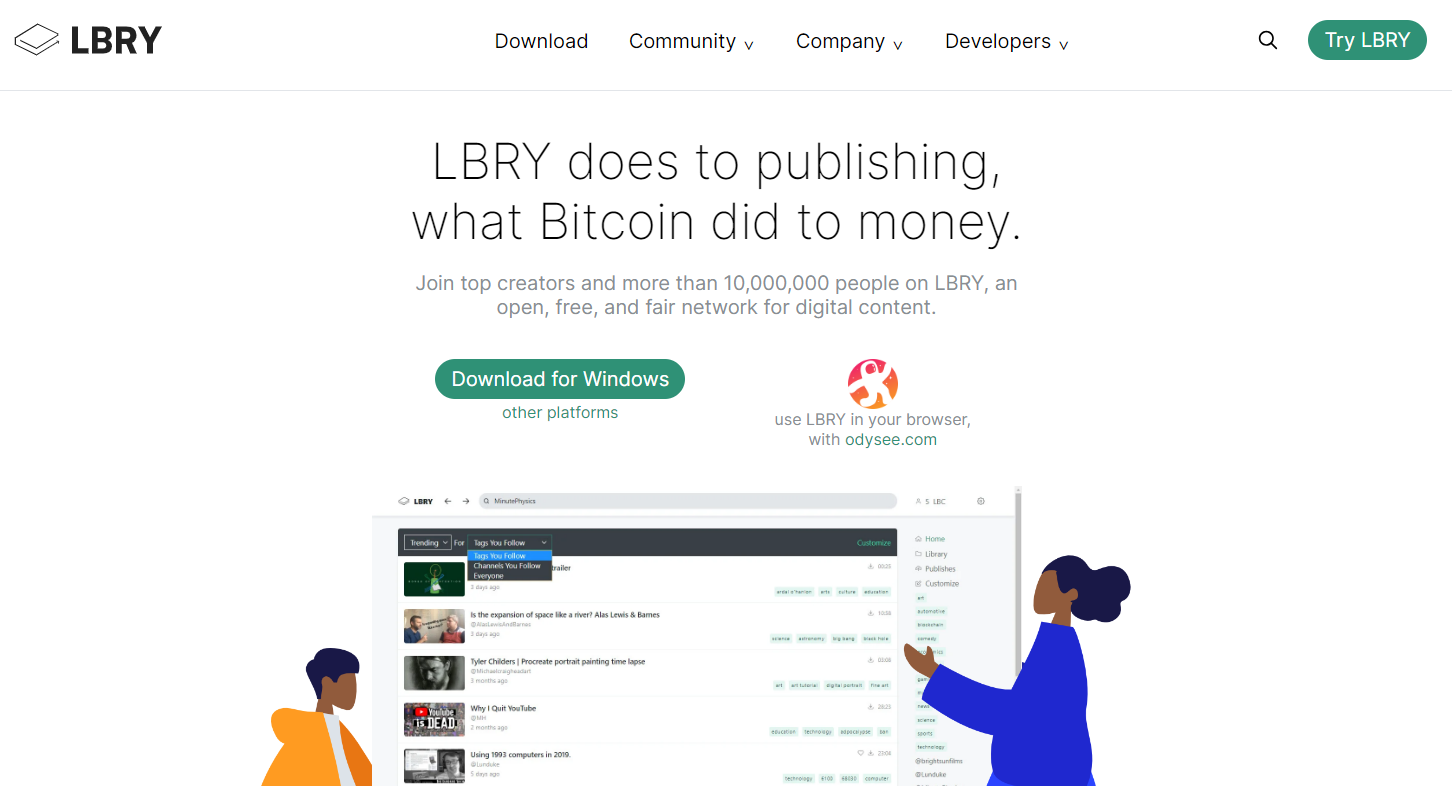
LBRY is a blockchain-based open-source platform designed to offer a decentralized alternative to mainstream content sharing platforms like YouTube. It allows users to publish, share, and monetize their content using LBRY Credits (LBC), the platform's native cryptocurrency. LBRY emphasizes user privacy and operates on a peer-to-peer network, ensuring that no central authority controls the content or user data.
The platform supports various content types, including videos, music, eBooks, and more. LBRY’s commitment to an ad-free environment and respect for user privacy makes it an attractive choice for content creators and consumers looking for a liberated digital experience.
What the platform has to offer:
- Decentralized content sharing
- Supports multiple content types (videos, music, eBooks)
- Ad-free environment
- Monetization through LBRY Credits (LBC)
6. Friendica
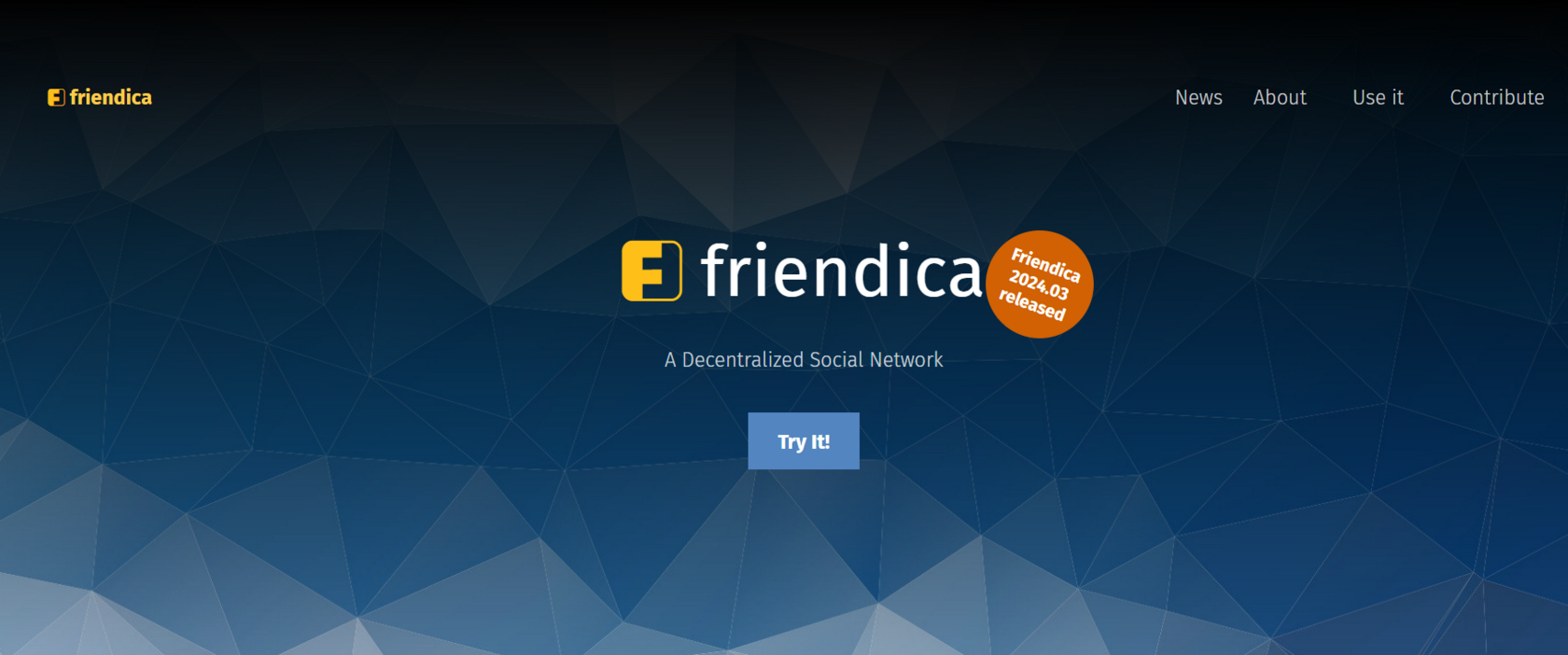
Friendica is a part of the Fediverse, a collection of interoperable platforms that allow users to interact across different networks. This decentralized social network aims to give users more control over their online experience by supporting various protocols such as ActivityPub, OStatus, and Diaspora. This wide protocol support ensures broad connectivity, enabling users to follow and interact with accounts across different platforms like Mastodon and Pleroma.
Friendica offers familiar social media features like status updates, photo uploads, and events, combined with extensive customization options through plugins. This makes it a versatile choice for users seeking a more tailored social networking experience.
What the platform has to offer:
- Interoperability with other Fediverse platforms
- Supports multiple protocols
- Customizable user experience
Benefits of Decentralized Social Media
Enhanced Privacy and Security
Traditional social media platforms often store vast amounts of user data in centralized databases, making them attractive targets for hackers. In contrast, decentralized social media platforms distribute data across a network of nodes, making it more difficult for malicious actors to breach security and access personal information.
Decentralized platforms use advanced cryptographic techniques to ensure that user data remains private and secure. Users have control over their encryption keys, meaning only they can access their data unless they choose to share it. This reduces the risk of unauthorized data access and ensures that users have more control over their personal information.
Censorship Resistance
Centralized platforms often face pressure from governments, corporations, and other entities to censor content that is deemed inappropriate or controversial. This can lead to the suppression of free speech and the stifling of diverse viewpoints.
Decentralized social media, however, operates without a central authority, making it inherently more resistant to censorship. Content is stored across a distributed network, and decisions about what content is allowed are often made by the community rather than a single entity. This structure ensures that users can share their opinions and ideas without fear of unjust removal or suppression.
Ownership and Control
On traditional platforms, users often relinquish ownership of their content to the platform itself, which can then use, modify, or monetize it without the user's consent. This can lead to a feeling of powerlessness and exploitation among users.
In contrast, decentralized platforms typically operate on principles that prioritize user ownership. Content creators retain full rights to their work, and any revenue generated through the platform (such as through token-based rewards or direct monetization) goes directly to the creators rather than to the platform. This model not only incentivizes high-quality content creation but also ensures that users are fairly compensated for their contributions.
Innovation and Open-Source Development
Unlike centralized platforms, which may prioritize profit over user needs, decentralized platforms benefit from the contributions of a diverse community of developers who can create and implement new features, fix bugs, and improve security.
The open-source nature of many decentralized platforms means that anyone can contribute to the codebase, propose new ideas, and develop applications that enhance the platform's functionality. This leads to a more dynamic and responsive ecosystem, where users' needs and preferences drive continuous improvement and innovation.
Transparency and Trust
Traditional platforms often operate as black boxes, with opaque algorithms and policies that govern content visibility and user interactions. This lack of transparency can erode trust between users and the platform.
In decentralized social media, the use of open-source software and blockchain technology ensures that all operations are transparent and verifiable. Users can audit the code, understand how their data is being used, and verify that the platform is operating as intended. This transparency builds trust, as users can see for themselves that the platform is acting in their best interests.
Economic Opportunities and Incentives
Many platforms use cryptocurrency or token systems to reward users for their contributions, whether it be content creation, curation, or other forms of engagement. These economic incentives can provide a new source of income for users and create a more equitable distribution of value.
By participating in the platform, users can earn tokens that can be traded, sold, or used within the ecosystem. This not only motivates users to be more active but also aligns their interests with the platform's growth and success. Such incentive structures foster a more engaged and invested community, driving the platform's development and sustainability.
Wrapping Up
The significance of decentralization for the future of social media cannot be overstated. As concerns about privacy, data security, and censorship continue to rise, decentralized platforms offer a compelling alternative that addresses these issues head-on. By prioritizing user control, transparency, and equitable value distribution, decentralized social media platforms are poised to redefine the landscape of online interactions.
As technology advances and more people become aware of the benefits, the adoption of decentralized social media is likely to accelerate, leading to broader societal changes in how we communicate, share information, and build communities online.




